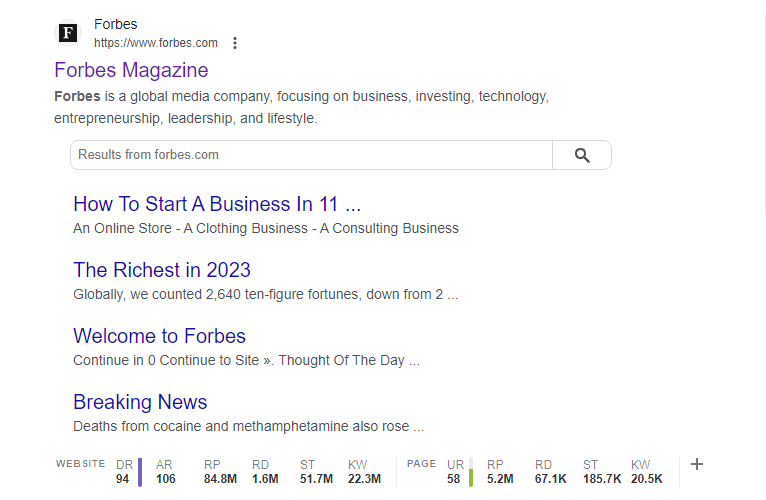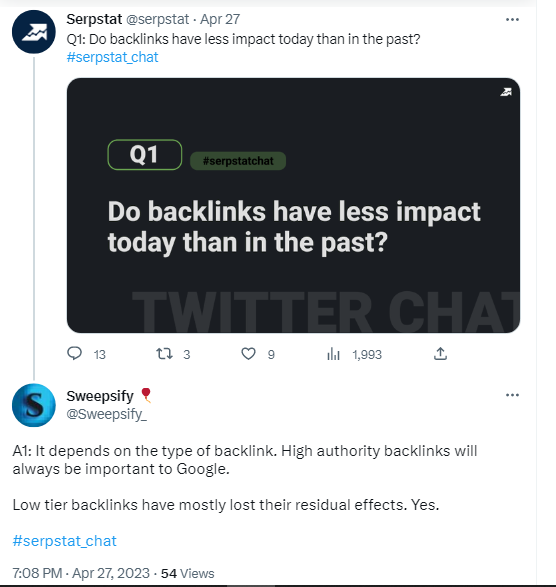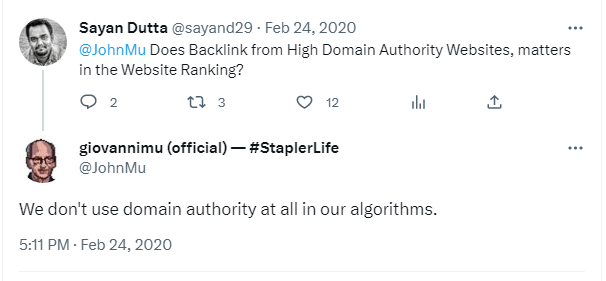Having been in SEO since 2009, I can tell you from first-hand experience (of ranking several service businesses and ecommerce sites — personal and clients’) that all backlinks are not equal
And it doesn’t matter if you try to game the system by increasing the quantity or velocity of your links. Some backlinks won’t increase your rankings on search results.
For example, you can’t compare the impact of Forbes’ backlink to that of “Squeeze Growth.”


Apart from considering the backlink profile and organic traffic, Forbes stands out as a well-established and recognized brand. Conversely, Squeeze Growth lacks such recognition.
Interestingly, your site’s Domain Authority (DA) or Domain Rating (DR) is likely higher than that of Squeeze Growth. In other words, you can disregard any concerns about receiving link juice.
In summary:
There’s something called a high authority backlink.
In this piece of content, I will delve into everything you need to know about such links. More importantly, I will demonstrate how to acquire them as a skilled link builder, focusing on the creation of high-quality content.
What Is All The Fuss About High Authority Backlinks? Should You Care?
What Are SEOs Saying?
In a reply to a tweet “about the relevancy of backlinks today,” Sweepsify said, “it depends on the type of backlink. High authority backlinks will always be important to Google.”

And I agree with Sweepsify’s stand. Why bother wasting resources on low-tier backlinks that will likely not help your SEO goals?
Another tweep agrees with Sweepsify’s view. Padula Media adds that “backlinks from high authority websites that are relevant to your niche carry more weight and are more valuable for SEO purposes.”

That is also true. But does Google agree?
Let’s find out!
What Does Google Say?
While Google doesn’t exactly have a say about high authority backlinks, dear “Uncle” John Mu has some “contentious” views.
In a reply to a tweet “about the relevance of high domain authority backlinks,” John Mu said, “we don’t use domain authority at all in our algorithms.”

Oddly enough, John Mu says something entirely different in Google Search Central SEO hangout, 2021.
When asked what matters between the “quantity” of a site’s backlinks or their “uniqueness,” John Mu replied as below:


But let me ask you this:
What makes a news site BIG?
Popularity, huh?
If a news site is popular, it definitely has a high domain authority and domain rating. Let’s see examples to solidify that argument.

We’ll pick 5 from the list and check their respective DA/DR:
- Huffpost: DA 94, DR 92
- Wall Street Journal: DA 94, DR 92
- ABC News: DA 93, DR 92
- The Economist: DA 93, DR 91
- USA Today: DA 94, DR 92
What’s even funny is that John asked that you feature on the homepages of such sites. Popular news websites with 90+ ratings!
Well, the feat is achievable. However, it will take time and considerable effort. Plus, you’ll spend on the high end to make that possible.
How much are we looking at?
Check this detailed guide on link building pricing for insights!
So, what should you do?
Should You Care About Getting High Authority Backlinks?
Analyzing what SEOs think and John Mu’s conflicting replies, the fact is clear:
High authority backlinks are a thing, and they matter.
But prioritize the niche-relevant ones to get the most results from high domain authority backlinks (or any links). They are golden.
So, shall we discuss how to get the high authority links already?
Hold on a bit; let’s see what makes a link high authority.
White Hat SEO
In the initial stages of SEO, employing strategies that are now considered misleading and manipulative used to yield positive results.
Unethical SEO techniques, like cloaking, stuffing keywords, and purchasing links, were once effective methods for boosting your website’s ranking.
However, Google took steps to curb these strategies, implementing algorithm updates like Penguin in 2012.
The objective was to eliminate spammy websites and enhance user experience by elevating top-notch content to the forefront of search engine results pages (SERPs).
Currently, Google algorithmically penalizes illegitimate link building, emphasizing the importance of white hat approaches for establishing sustainable link networks. Adhering to Google’s webmaster guidelines is crucial to avoid these penalties.
These methods not only ensure compliance but also resonate well with genuine users. Crafting original content allows content creators to meaningfully engage with their audience.
Prioritizing white hat strategies and securing links from authoritative sites contribute to a more favorable page rank, all while evading penalties imposed by search engines.
Prioritizing white hat strategies and securing links from authoritative sites contribute to a more favorable page rank, all while evading penalties imposed by search engines. The focus should be on quality rather than the quantity of backlinks.
What Makes A Backlink High Authority?
Domain Authority (DA) and Domain Rating (DR) represent scores assigned by SEO tools to characterize a website’s backlink portfolio. Moz employs the former metric, while Ahrefs utilizes the latter.
Nevertheless, based on my personal research, I’ve consistently observed that Ahrefs’ DR tends to be lower than Moz’s DA. Consequently, my recommendation would be to favor the former assessment. Wondering why?
In the event that these ratings were to eventually rise, you wouldn’t suffer any setbacks from having a lower initial estimate. Moreover, your aspirations wouldn’t be disappointed.
By the way, it’s important not to exclusively fixate on the domain authority or rating of others. It’s equally vital to enhance your own. Here’s the rationale:
After thoroughly examining numerous top-ranking URLs, I’ve discovered that those attaining high rankings possess robust scores.
Uncertain about how to enhance your website’s DA/DR?
Take a look at this comprehensive guide I authored on elevating your website’s DA.
Having said that, let’s delve into the process of identifying high-authority backlinks, a core component of improved rankings.
These valuable backlinks are pivotal for your website’s success.
They hinge on link-worthy content, specific content formats, and understanding traffic patterns, steering clear of link farming, and cultivating a healthy link profile without resorting to the acquisition of lots of backlinks.
Read this practical guide I wrote on increasing sites’ DA.
Link Relevancy
The significance of backlinks holds immense value. In the past, the strategy that proved effective involved the creation of numerous high-authority links from various websites.
However, with Google’s algorithmic shifts and their commitment to providing optimal user experiences, the relevance of the websites you connect with has gained paramount importance.
Associating your content with sites that are entirely unrelated can adversely affect your ranking, resulting in a decline in pertinent traffic to your own website.
The key lies in linking to high-authority sites that align with the core theme and subject matter of your content.
To achieve this, consider collaborating as a guest blogger with influential websites and credible sources within your niche.
This approach, championed by SEO expert Larry Page, can transform your website into a valuable resource for users, while simultaneously bolstering your SEO efforts.
5 Evergreen Methods Of Finding High Authority Backlinks
Get On Podcasts/Webinars
Earlier, I quoted excerpts from Google Search Central SEO hangout, 2021. But I’m not the only one quoting that webinar — other sites with even more authority are (SEJ, for example).
What do you make of all that?
Webinars are a proven method for acquiring backlinks, particularly from high-authority websites. Here’s the strategy:
Authors of valuable content on authoritative websites seldom include links to external articles unless they are highly relevant, usually limited to external reports and studies. However, they are more inclined to reference webinars and podcasts.
Why is that the case?
Citations within podcasts carry greater authority and serve as undeniable demonstrations of expertise. This aligns perfectly with Google’s E-A-T guidelines.
Therefore, endeavor to participate in as many niche-related podcasts as possible. Share your valuable insights and expertise. Eventually, an author on your desired news platform will take notice.
If this approach seems time-consuming, consider exploring the following four alternative methods for enhancing your SEO strategy with relevant content.
Be A Source On HARO
I’ve previously delved extensively into this technique in our article on regular backlinks from HARO link building [insert hyperlink to our article on the topic]. Let me provide a concise overview of the key points here.
HARO serves as a valuable platform for establishing connections with media professionals at leading publications.
These professionals regularly post queries on HARO, seeking unique stories that can distinguish their websites from the rest.
You have the opportunity to tap into this demand.
However, it’s crucial that your news is genuinely noteworthy; otherwise, your pitch may get lost amidst the noise.
This ensures that your SEO profile benefits from high-quality backlinks from relevant sources, rather than accumulating low-quality backlinks that could potentially harm your SEO efforts.
Broken Links
Broken link building is one of my favorite ways to get authority backlinks. And that’s because of the concept: “You help to get helped.”
Let me explain!
In this method, you start by offering value. You’ll scrape through your target site, looking for broken links.
After finding the broken links, you’ll offer to create a replacement page.
And because you put the target interest first, your chances of getting a backlink are high. Nevertheless, ensure your pitch shows value.
Read further on how to find broken link building opportunities!
Link Exchange
Inbound ink exchanges function much like addressing broken links, offering reciprocal advantages to the involved parties. Nevertheless, several distinctions set them apart.
Inbound link exchanges can be likened to a “community of friends supporting one another,” and there may be certain criteria for participation.
Furthermore, a substantial high domain authority is a prerequisite, as lacking it would fail to enhance the link quality for the other parties engaged in the exchange.
To initiate such exchanges, one might need to provide an email address, ensuring a wide range of referral traffic.
Note:
Link exchange can be borderline gravy. So, do it RIGHT. This guide can help.
Linkable Assets + PR Outreach
This approach is straightforward. And I prefer it to guest posting.
I’m not saying guest posts don’t work. But they can be too much work. Linkable assets are better.
So, how does this work?
- First, determine your linkable asset — you could use infographics, e-tools, curated statistical reports, or skyscraper content.
- Follow the journalists/authors on your target sites.
- Send a pitch about your asset, or
- Run an ad for your “assets.”
Either way, you won’t lose. But you will spend more money here than other methods.
Additional Tips On Finding The REAL Authority Links
Avoid The No-index Trap
Guest posting on MAJOR news sites is only one part of the deal. Are the sites indexing the articles?
Huffington Post, for example, doesn’t index contributor articles. This started in 2016 and doesn’t look like stopping soon.
Like Huffington Post, Buzzstream doesn’t index contributor posts. This case is humorous since the site allows several users to own a contributor account.
And so?
Google won’t index your guest post — and your backlinks — let alone crawl it and have a chance to get some link juice.
The Huffington Post & Buzzstream cases are even better. The sites might change their mind, and your links will be crawled.
Forbes and Inc Magazine are worse. How so?
Any backlinks on your Forbes and Inc Magazine posts will attach a “nofollow” tag. In other words, no link juice will be sent to your site or pages.
Bottom line:
It’s best to go through the editorial account to get backlinks from high authority sites. Otherwise, you’d only be helping the websites build their resource banks.
DA/DR Scores Can Be Manipulated
Earlier, I told you DA/DR scores are insights from SEO tools. In other words, if you understand how they are calculated, you can shoot up your score.
In essence, there are several fake authority sites. Often, such websites get the STRONG scores using black hat strategies — especially link farms.
How can you identify these “fake sites”?

- Don’t be EASILY conned if your target’s domain rating/authority is 70+.
- Check the traffic too.
- For a site to have 70+, the traffic should not be less than 1K.
- Otherwise, you’re likely dealing with a fake authority site.
Look Beyond Just The DA/DR Score
Even when the said site has AUTHENTIC high authority, that’s not everything. You must still look at the exact page — especially for niche edits.
What’s the page rating (UR/PA)?
If the page rating is substantial, it’s likely to attract a significant amount of traffic. This can prove advantageous for your money site.
While there’s nothing inherently wrong with brand-new page features, it takes time for them to pass on link juice, based on my experience.
In addition to assessing the page rating, evaluate the site’s relevance. Does the content align with your anchor text or the landing page?
Are there considerations for page, contextual, and domain relevance?
Strive to ensure that the context and page alignment are on point — at the very least!
In the realm of SEO expertise, when dealing with matters of link roundups, outbound links, regular links, authoritative content, and relevant websites, it’s a matter of time before you see improvements in search visibility.
Avoid low-quality links and consider the potential benefits of email marketing for your strategy.
FAQs About High Authority Backlinks?
Can You Get High Authority Backlinks For FREE?
Yes, but it is rare.
Often, you have to pay through the nose to acquire high authority backlinks.
But getting such links for FREE is possible. Build a one-of-a-kind linkable asset; authority sites might reach out.
Often, from experience, you need an outreach campaign even for your linkable asset to get the best results. In this case, you’ll spend “a little” compared to buying the backlinks outrightly.
Also, watch out for fake authority sites when buying links. Don’t fall into the trap of link farms or no-index websites.
How Much Does A High Quality Link Cost?
Unfortunately, there is no definite answer. It all depends on your hire and the target site.
Nevertheless, you can expect a range of $500-2K per link — or even more.
What Is A High Authority Backlink?
A high authority backlink is the upvote obtained to your site from a website with a 70+ DA/DR score. Such links have the most juice to pass.
Note: SEMrush also has a similar rating for checking backlink profiles. It is called Authority Score (AS). But even that must be 70+ to be considered “high.”
What Is A High Quality Backlink?
What I call a high quality backlink is a mix of several features. For starters, it must be from an authority site. Also, the link must be relevant to your niche and the landing page.
Summarily, a high quality backlink is obtained from a site with a 70+ DA/DR score – related to your niche and with a relevant anchor text.
Is Guest Posting A Good Source Of High Authority Backlinks?
Yes, it is. But there are better methods.
If you have noticed, you’ll see I omitted guest posts from the list of the ways to authority backlinks. The reason is simple:
The chances are high that you’ll get into the “no-index” or “nofollow” traps like every other contributor.
Unlike PR and media outreach, guest posts don’t always work. Nonetheless, they can be effective if your article is unique and masterly crafted.
More importantly, check that the site you’re contributing to doesn’t do the “noindex” or “nofollow” trick.
High Authority Backlinks Don’t Come Cheap, But They Are 100% Worth The Hassle.
Acquiring an external link from a high-quality site boasting a DA/DR/AS score of 70+ is a significant endeavor. It demands a substantial investment of time, resources, and finances.
However, it’s crucial to note that the score is not the sole determining factor. The site must align with your business, encompassing the content, page, and anchor text in every aspect.
By meticulously aligning these elements, you can undoubtedly witness a boost in your search engine rankings. I can vouch for this based on my experience in managing both my monetary websites and those of my clients.
And if the methods discussed are confusing, you can always get help.

